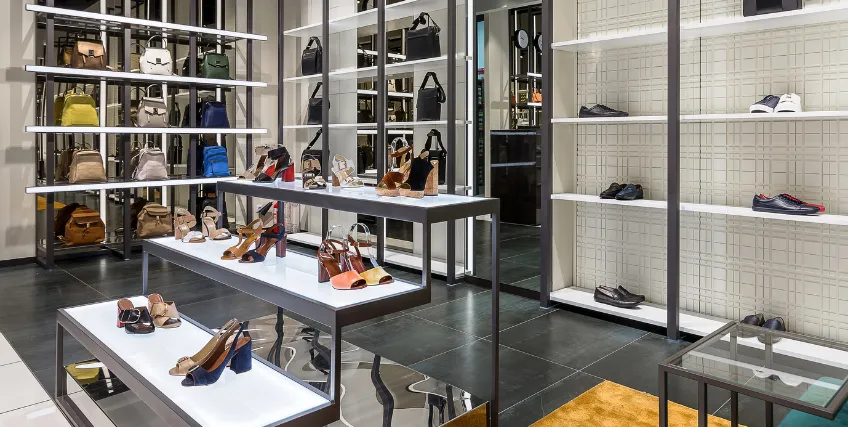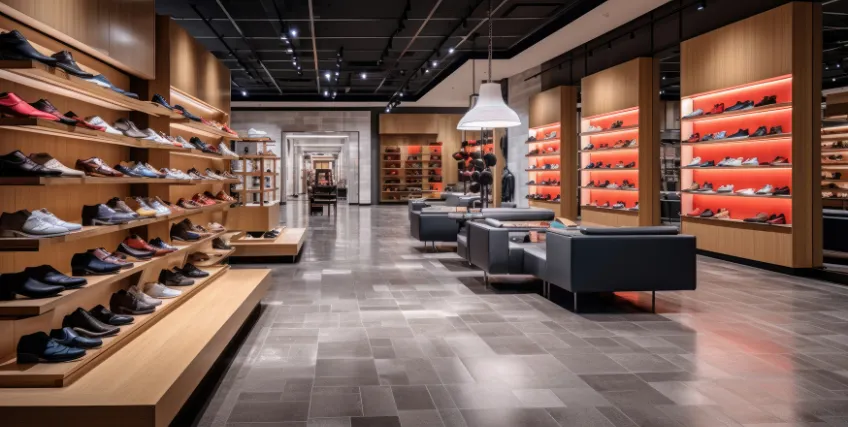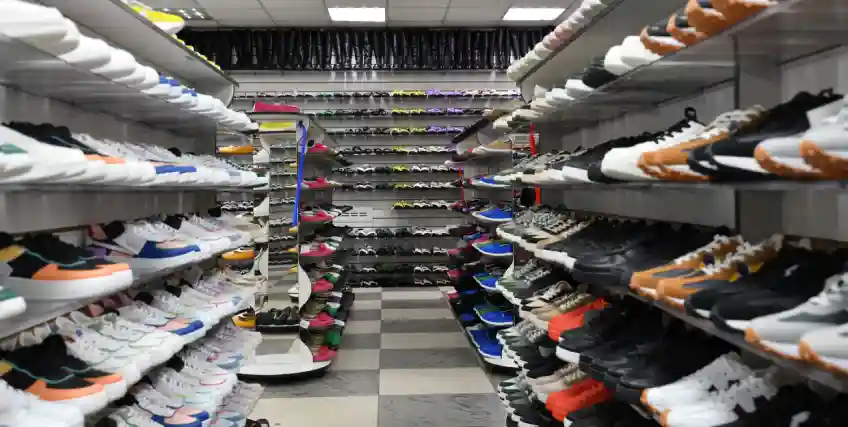Keep Up with Demand
Using a Loan for Shoe Stores
Looking for Business Financing?
Apply now for flexible business financing. Biz2Credit offers term loans, revenue-based financing, lines of credit, and commercial real estate loans to qualified businesses.
Set up a Biz2Credit account and apply for business financing
The U.S. shoe industry is growing fast, with trends shifting from traditional storefronts to ecommerce and hybrid retail models. From boutique labels to branded franchises, the need for consistent funding is high. Footwear stores face high upfront inventory costs, season-based stock changes, and expanding overhead.
Many shoe store owners often look for a loan for shoe stores to bridge gaps in cash flow, expand operations, or simply keep up with rising demand. Whether it’s stocking up on new releases, launching online platforms, or upgrading your point-of-sale systems, flexible business financing can make all the difference.
A loan for shoe stores helps with more than daily operations. It supports long-term growth, like leasing a second location, running large-scale promotions, or investing in direct manufacturing tools. The right financing provides access to needed working capital without sacrificing momentum.
Accessing a footwear business loan is also key for new entrepreneurs entering the retail business. With proper planning, strong documentation, and clear revenue goals, small business loans can unlock scalable growth in this fast-paced market.
Recent data shows that the U.S. footwear industry is expected to generate revenue of $101.36b in 2025, showing how much demand exists today. And as shopping habits evolve, keeping shelves stocked and systems upgraded requires timely, reliable business funding.
Common Financing Needs of Shoe Businesses
Every shoe business comes with its own set of expenses. From startup stores to established retailers, each phase requires different types of funding. A loan for shoe stores gives business owners the freedom to manage these needs without breaking momentum.
1. Store Setup and Renovation
Setting up a shoe store means dealing with upfront costs like lease deposits, fixtures, flooring, lighting, and signage. Renovations can include installing smart mirrors, improving dressing rooms, or building a sleek checkout area. These upgrades help attract foot traffic and improve customer experience. With the help of a loan for shoe stores, retailers can get started quickly or upgrade their physical presence to match shopper expectations. It’s also useful for startups needing showroom-ready space with branding elements that stand out.
2. Inventory for Seasonal Demand
Footwear is a seasonal business. Collections change based on trends, holidays, and climate. Whether it's summer sandals or winter boots, shoe store owners need to stay stocked with trending inventory. A footwear business loan helps secure bulk inventory at discounted rates or meet minimum order quantities from vendors. This ensures shelves are full before the season starts. Smart business funding also allows stores to react quickly when demand spikes unexpectedly.
3. Payroll and Staffing Costs
Customer-facing staff is key for success in any retail business, especially when guiding purchases or handling returns. A loan for shoe stores can cover hiring costs, training, payroll taxes, and salaries during slow months. It can also help businesses meet labor demands during the holiday rush or back-to-school season. For startups, this funding ensures team building happens without draining early-stage capital. Payroll stability also improves employee retention, which is vital for long-term store performance.
4. Ecommerce Platforms and Digital Ads
Shoes are a high-competition product online. For any shoe business, having a functional ecommerce store is now essential. This includes investment in inventory tracking, payment options, mobile UX, and digital marketing campaigns. A loan for shoe stores gives retailers the budget to build or enhance their online presence. Funding also supports paid campaigns on platforms like Google, Facebook, and Instagram to drive traffic and grow the customer base. Retailers can also invest in video ads or influencer partnerships.
Best Uses of a Loan for Shoe Stores
A well-planned loan for shoe stores doesn’t just plug financial holes. Whether that’s growth, technology upgrades, or production improvements, it helps business owners take strategic steps toward bigger goals
Below are the most impactful ways shoe store owners can use funding to scale their operations and strengthen their market position.
1. Bulk Inventory and Vendor Deals
Many vendors offer better rates when footwear is bought in bulk. But not all retailers have enough upfront cash to take advantage of these deals. A loan for shoe stores gives access to bulk purchasing power, helping store owners improve margins and expand their seasonal offerings. Buying early also gives you a better pick of trending designs before competitors move in. This can directly improve cash flow by reducing inventory costs and boosting return on investment.
2. Custom Footwear Tools and Equipment
Some shoe store owners branch into personalized footwear, orthotics, or small-batch manufacturing. Whether you need 3D foot scanners, custom mold machines, or high-end materials, it all adds up. A footwear business loan helps acquire this equipment without draining existing resources. It allows brands to build a niche presence in the shoe industry, giving customers unique products they can’t find elsewhere. That edge can boost loyalty and command higher prices.
3. Launching a New Location or Franchise
Opening a second location can expand your brand reach, but it requires real investment. Expenses include leasing, permits, staffing, and marketing. A loan for shoe stores provides that upfront business funding without tapping into existing revenue streams. This helps owners expand into high-traffic areas or test new markets through pop-up outlets or kiosk setups. It also supports early-stage entrepreneurs launching their first store under a franchise model.
4. POS Systems and Checkout Integration
Fast, easy checkout boosts customer satisfaction. Investing in smart point of sale systems with built-in inventory tracking, customer profiles, and multiple payment options is a smart move. A loan for shoe stores can help cover these tech upgrades, ensuring smoother transactions in-store and online. Integrated POS systems also allow better data collection, which helps with inventory decisions and customer targeting.
Types of Business Loans for Shoe Stores
There are several loan programs designed to support the needs of shoe store owners. Whether it's stocking shelves or expanding locations, the right funding option depends on the goal and business profile.
Here are four widely used financing options available in the retail business space.
1. Working Capital Loans
These short-term loans help cover everyday expenses like rent, utilities, payroll, and vendor payments. They're ideal for managing temporary cash flow issues during slower sales periods. A loan for shoe stores used this way ensures operations continue uninterrupted. Most lenders look at recent revenue, bank statements, and creditworthiness. Repayment terms are often weekly or monthly, depending on the agreement. This option gives flexibility without requiring major collateral, making it popular among small and mid-sized retailers.
2. Commercial Real Estate Loans
If you're buying, renovating, or expanding a retail space, a commercial real estate loan can help. These are long-term loans used to fund location purchases or remodels. With a solid business plan and good credit score, a loan for shoe stores focused on real estate helps secure prime storefronts in high-traffic areas. These loans usually require a down payment, and the property often serves as collateral. Ideal for growing shoe businesses looking to own rather than lease.
3. Lines of Credit
A business line of credit provides flexible access to funds that you can draw as needed. Think of it like a business credit card, but with potentially lower interest rates. A loan for shoe stores structured as a line of credit helps manage unexpected costs like vendor delays or seasonal slowdowns. You only pay interest on the amount used. This option is great for established retailers who want to smooth out irregular income or cover shortfalls.
4. Short-Term Business Loans
These loans are repaid over a few months to a year and are useful for quick cash injections. Whether it's a clearance event, pop-up shop, or emergency repairs, a short-term loan offers fast support. A loan for shoe stores with shorter repayment terms may have higher fees, but funds are disbursed quickly. These are ideal when timing is crucial, and the returns can offset the cost. Lenders usually assess credit history and cash flow consistency.
Pros and Cons of Shoe Store Loans
Getting a loan for shoe stores can unlock real growth potential but it also comes with a few trade-offs. Understanding the upside and risks helps shoe store owners make more confident decisions before signing any agreement.
Below are key advantages and drawbacks of using business loans in the footwear industry.
Pros
1. Quick Access to Working Capital
Many loan programs offer fast funding, sometimes within days. That speed helps retailers respond quickly to trends or unexpected vendor delays. Access to working capital keeps your operations running without needing to pause key business decisions. For seasonal businesses like shoe stores, speed is often a deal-breaker.
2. Boosts Inventory and Sales Opportunities
A loan for shoe stores allows you to buy inventory in advance, access vendor discounts, and prepare for seasonal peaks. That directly affects your cash flow and helps improve overall profitability. When shelves are full, customers have more options, and conversion rates improve, both online and in-store.
4. Helps Build Credit
Making consistent monthly payments on time builds positive credit history for your business. This strengthens your profile for future funding, allowing access to better interest rates and larger loan amounts. Responsible borrowing can also improve relationships with vendors and landlords who may check business credit.
Cons
1. Repayment Pressure
Most loans require regular payments, even when sales dip. Missed payments can hurt your credit score and lead to late fees or contract penalties. A loan for shoe stores must align with predictable revenue, or it can strain the business during slow months.
2. Higher Interest for Riskier Profiles
Retailers with bad credit or inconsistent income may be offered higher interest rates. This raises the total cost of borrowing, cutting into profit margins. If the return on investment isn’t clear, the loan may create more burden than benefit.
3. Collateral or Down Payment Requirements
Many lenders request a down payment or assets as security. That can be difficult for startups or small business owners who are just beginning. If the loan defaults, the lender may claim that asset - whether it’s a commercial lease, equipment, or inventory.
How to Qualify for a Footwear Business Loan
Qualifying for a loan for shoe stores isn’t just about income; it’s about overall business health. Lenders assess financial strength, reliability, and planning before offering business financing.
Here’s what most lenders expect before approving a footwear business loan.
Business and Personal Credit Score
Lenders will review both business and personal credit scores to assess creditworthiness. A strong score shows you’ve handled debt responsibly. Most shoe store loans require a score above 650, though some programs may allow lower scores for higher interest rates. A weak score may lead to denials or stricter repayment terms. Monitoring and improving your credit before applying helps boost your approval odds.
Revenue Consistency and Bank Statements
Lenders want to see stable monthly sales and clean bank statements. Irregular deposits or overdrafts can raise red flags. Your shoe store’s ability to repay will be judged by average revenue, cash flow, and any past loan performance. If you're seasonal, explain how sales vary month to month and how you plan to manage off-peak periods with the loan amount.
Clear Business Plan and Financial Projections
A solid business plan shows how the loan will be used, what return it will generate, and how it aligns with your growth strategy. It should include future revenue estimates, marketing channels, and product sourcing. For shoe store owners, detailing inventory cycles and social media strategies helps show lenders you’ve done the math. Strong documentation reduces risk in the lender’s eyes.
Legal Documents: Licenses and Permits
Most lenders require business licenses, permits, or resale certificates. These prove your store is compliant and legally operating in its state or city. Without them, your loan application may be delayed or denied. If you're a startup, having EIN registration, a commercial lease, and seller’s permit adds to your credibility. Uploading these with your application simplifies the approval process.
Trusted by Thousands of Small Business Owners in America.**
Simply because we get what you go through to build a business you believe in.
**Disclaimer: All stories are real, as told by real business owners. Customers do not receive monetary compensation for telling their stories.
From One Entrepreneur to Another: We Get You
We understand what's behind building a business you believe in.
All stories are real, as told by real business owners. Customers do not receive monetary compensation for telling their stories.



Articles on Loan for Shoe Stores
How to Start a Shoe Store Business With the Help of a Business Loan
Whether you sell online or in-store, you’ll need reliable vendors, a good grasp of cash flow, and an attractive storefront. Most importantly...
How to Create a Winning Financial Plan for Your Shoe Store
Opening a shoe store is surely an exciting business idea. However, excitement alone cannot guarantee the success of a business.
Shoe Store Franchises: How Business Loans Can Help You Step into Ownership
In today’s competitive market, the U.S. shoe industry is booming, and new opportunities for new store owners are expanding fast.
Frequently Asked Questions on Loan for Shoe Stores
1. What can I use a loan for shoe stores for?
You can use a loan for shoe stores to cover inventory, payroll, renovations, marketing, or expansion. Many retailers also use funding for launching ecommerce platforms, upgrading point of sale systems, or managing seasonal slowdowns. It’s a flexible tool for working capital and long-term growth.
2. Can I get shoe store loans with bad credit?
You might but your options may be limited. Some lenders offer shoe store loans to applicants with bad credit, but you might face higher interest rates and shorter repayment terms. A strong revenue history and organized financial statements can still improve your approval odds.
3. Is a down payment required for a footwear business loan?
Some loans require a down payment, especially if you're applying for real estate or equipment financing. Short-term shoe store loans may not require any upfront funds, but they typically come with quicker repayment schedules. It depends on the loan type and your creditworthiness.
4. Do I need collateral to qualify?
Not always. Some loan for shoe stores options are unsecured, while others require collateral like equipment, inventory, or property. Having a strong credit history or consistent revenue may reduce the need for physical assets.
5. Are there loans available for new shoe store startups?
New entrepreneurs can access funding through SBA loans, grants, or private lenders who accept startups with strong plans. Your business plan, projected sales, and industry research will play a big role in getting approved.
Frequent searches leading to this page
Term Loans are made by Itria Ventures LLC or Cross River Bank, Member FDIC. This is not a deposit product. California residents: Itria Ventures LLC is licensed by the Department of Financial Protection and Innovation. Loans are made or arranged pursuant to California Financing Law License # 60DBO-35839



